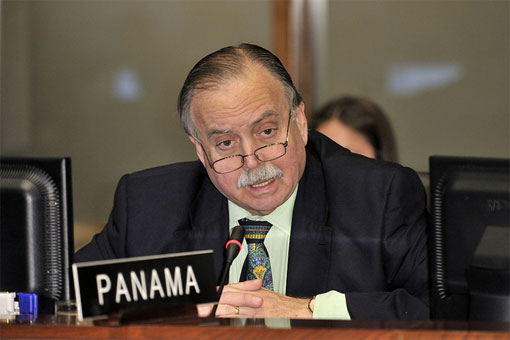Last week, Ambassador Guillermo Cochez permanently left his post as Panama’s permanent representative to the Organization of American States (OAS) after Panamanian President Ricardo Martinelli ordered him to step down on January 17 for criticizing the delayed inauguration of Venezuelan President Hugo Chávez. His voice will be missed in the ongoing debate for change at the Inter-American Commission on Human Rights (IACHR).
In 2012, Venezuela became the first Latin American country to denounce the landmark 1969 American Convention of Human Rights. Since 2002, Venezuela had denied the IACHR access to its territory to monitor the country’s human rights situation. In 2010, Venezuelan President Hugo Chávez referred to the then-executive director of the IACHR, Santiago Cantón, as “pure excrement.”
The Chávez government’s bold anti-IACHR rhetoric at the OAS is routinely echoed by its counterparts from Ecuador, Nicaragua and Bolivia, who have proved to be similarly intolerant to criticism of the rule of law and human rights issues. During the past two years, these countries have called for reforms that would weaken the IACHR and the OAS Special Rapporteur for Freedom of Expression. They have been joined, in part, by the governments of Colombia and Argentina.
Under a newly-coined “principle of non-selectiveness,” these countries claim that Chapter IV of the IACHR’s annual report—which currently singles out the countries it considers to be undergoing the most serious human rights situations—should be amended to address all 34 participating OAS member states (as proposed by Argentina, Bolivia, Colombia, and Ecuador) or be eliminated altogether (as proposed by Nicaragua and Venezuela).
Ecuador has also proposed that the Special Rapporteur for Freedom of Expression—which currently issues reports and periodic communications to states regarding press freedom concerns— should instead turn into an advisor to the Inter-American Court of Human Rights (IACHR). Alternatively, Ecuador has proposed that states write a “code of conduct” for the Special Rapporteur to follow. If these proposals were to be implemented, both the IACHR’s capacity to prioritize based on severity of abuses and the valuable role of the Special Rapporteur would be significantly crippled.
But where do the remaining OAS countries stand as a handful of governments seek to weaken the OAS’s institutions? Sadly, they have no clear stance.
Although representatives of the United States and Canada timidly expressed concern that the above-mentioned proposals would dilute the work of the IACHR, the only voice of dissent came from Cochez. “A significant number of [OAS] member states, including a few that should know better, have opted to neglect that which is our true commitment, and seem to ignore what the consequences are for abandoning the promotion and defense of democracy,” Cochez said.
Panama—the government Cochez represented until January 17—has admittedly not shown the best democratic credentials itself. In 2011, the Human Rights Foundation (HRF) denounced President Ricardo Martinelli for ordering the arbitrary expulsion of two critical foreign journalists and human rights activists, while, the Due Process of Law Foundation (DPLF) criticized Martinelli for nominating political allies to the Supreme Court. Martinelli has also continuously faced human rights challenges for violating the rights of indigenous peoples to be consulted on mining projects in their territories.
But Panama’s weak record on freedom of expression and signs of democratic erosion pales in comparison to Venezuela, Ecuador, Bolivia and Nicaragua, whose leaders have rewritten their countries’ constitutions, extended term limits, judicially persecuted members of the opposition, cracked down on the independent media, and grabbed full control over legislatures and judiciaries.
The OAS’ democracy clause states that governments who erode democracy—whether by seizing power through coups or by eroding democratic protections after elections—should be monitored or suspended from the OAS. Under this standard, it was correct to suspend Roberto Micheletti’s government in Honduras from the OAS. But the democracy clause should have also been applied to Venezuela by suspending the Chávez government from the OAS—and to Bolivia, Ecuador and Nicaragua by dispatching the kind of high-level diplomatic missions that the OAS sent to Peru in 1992 and 2000 to monitor the government of Alberto Fujimori.
The straightforward and principled—yet lonely—statements by Cochez at the OAS could have continued until Panama’s presidential elections in May 2014, if not for his sudden dismissal.
Whether the current standoff caused by President Chávez’ illness is in breach of the Venezuelan constitution should be debated by Venezuelan constitutional scholars. Beyond debate, however, is the fact that the erosion of democracy in Venezuela has long amounted to an “alteration” or “interruption” of the democratic order—and that the Chávez government should have long ago been suspended from participation in all bodies and meetings of the OAS.
When the Inter-American Democratic Charter was signed in 2001 after Fujimori fled Peru, it was unthinkable that, just a decade later, Fujimori-like governments would be allowed to systematically violate human rights and maneuver their way into multiple reelections while torpedoing the OAS, the IACHR and the OAS Special Rapporteur on Freedom of Expression from within.
Sadly, the only voice inside the OAS that outspokenly denounced the body’s lack of a principled leadership is now mute. Let us hope that, when the OAS General Assembly convenes in Ecuador in March to vote on the proposed reforms to the IACHR, someone will dare to speak out.
*Thor Halvorssen is president and Javier El-Hage international legal director of the New York-based Human Rights Foundation.
A version of this article was published in Foreign Policy last week.








